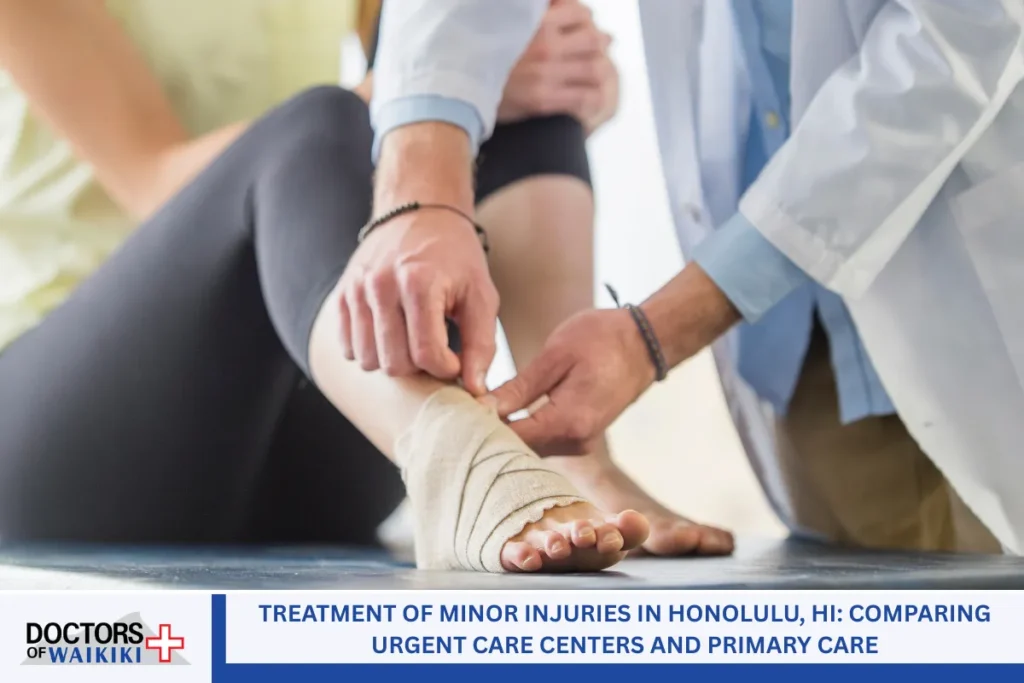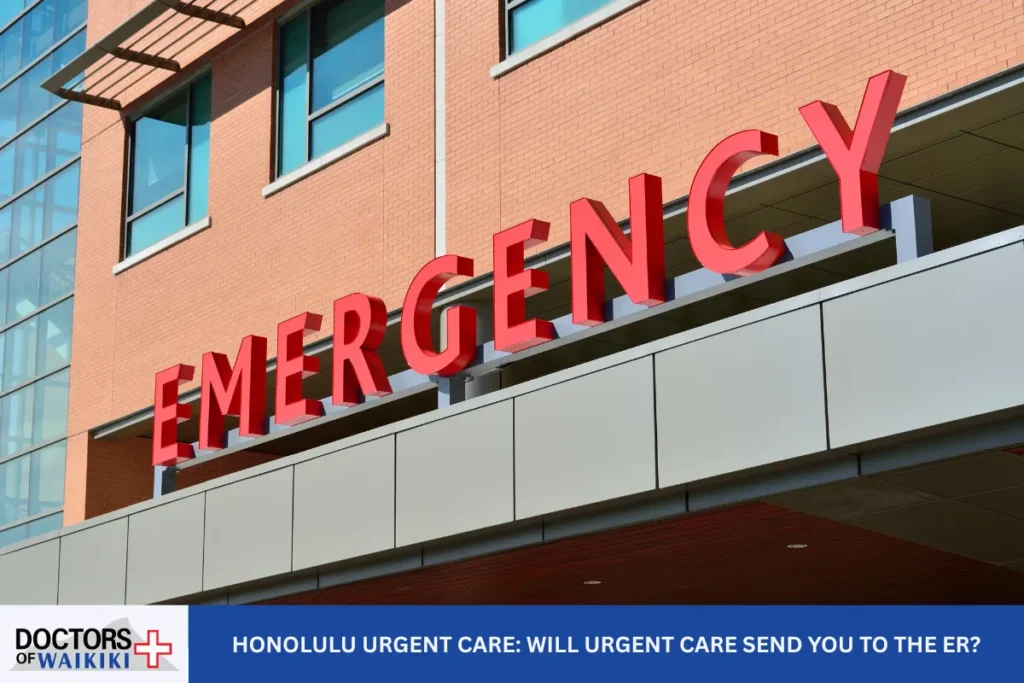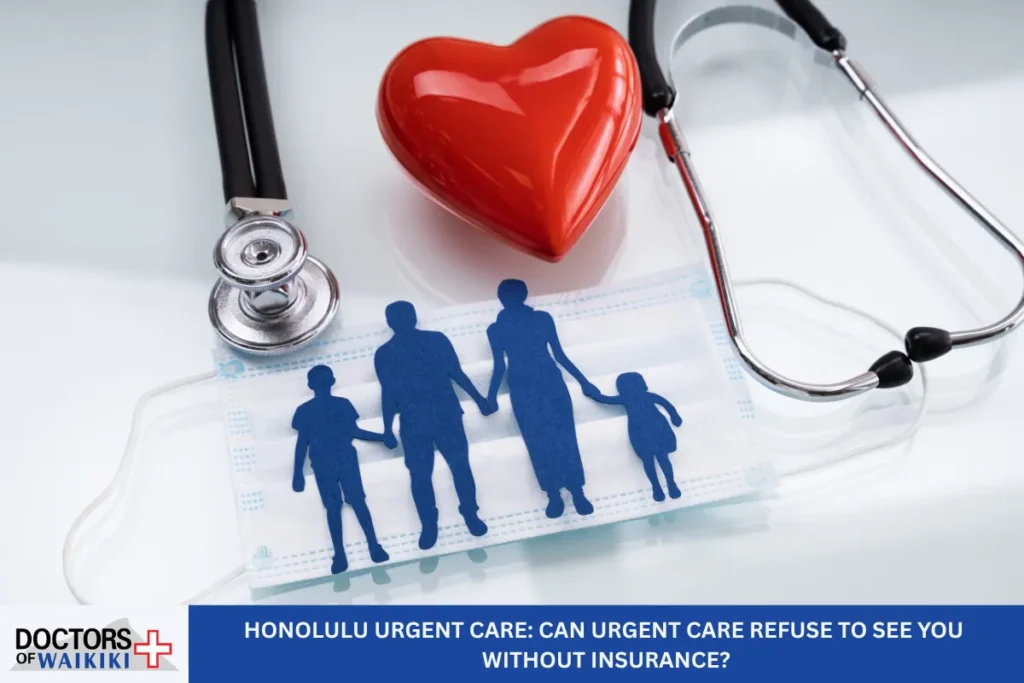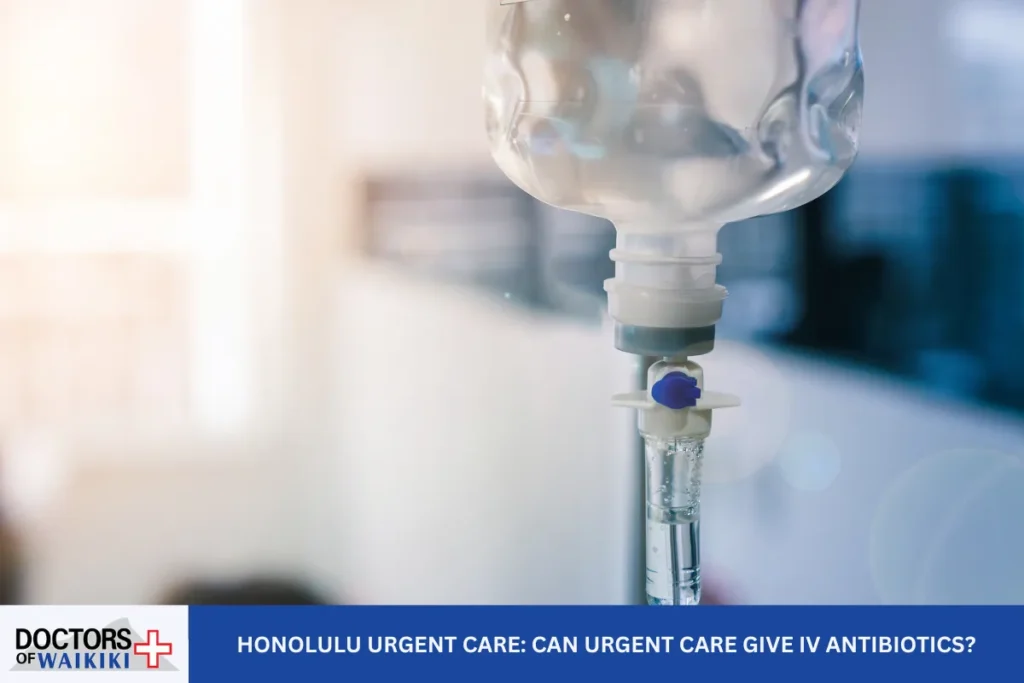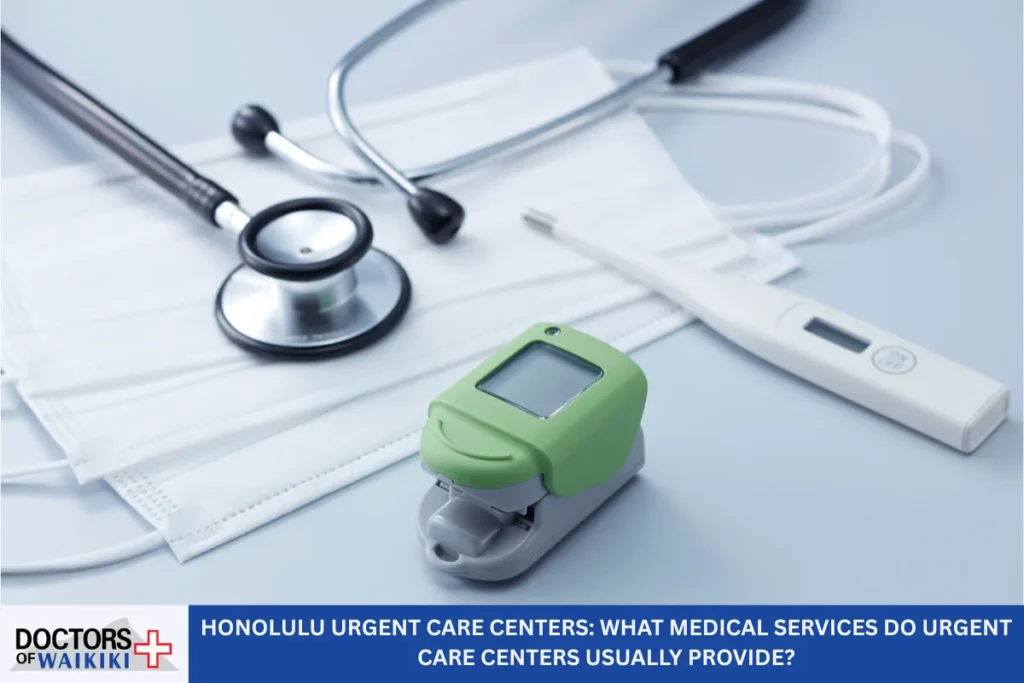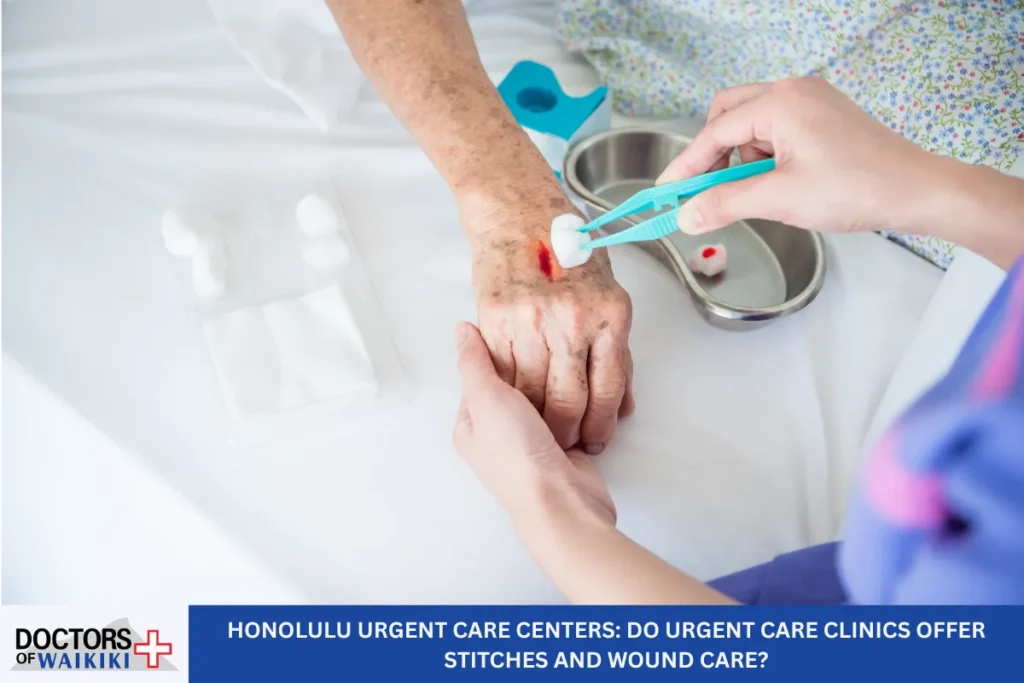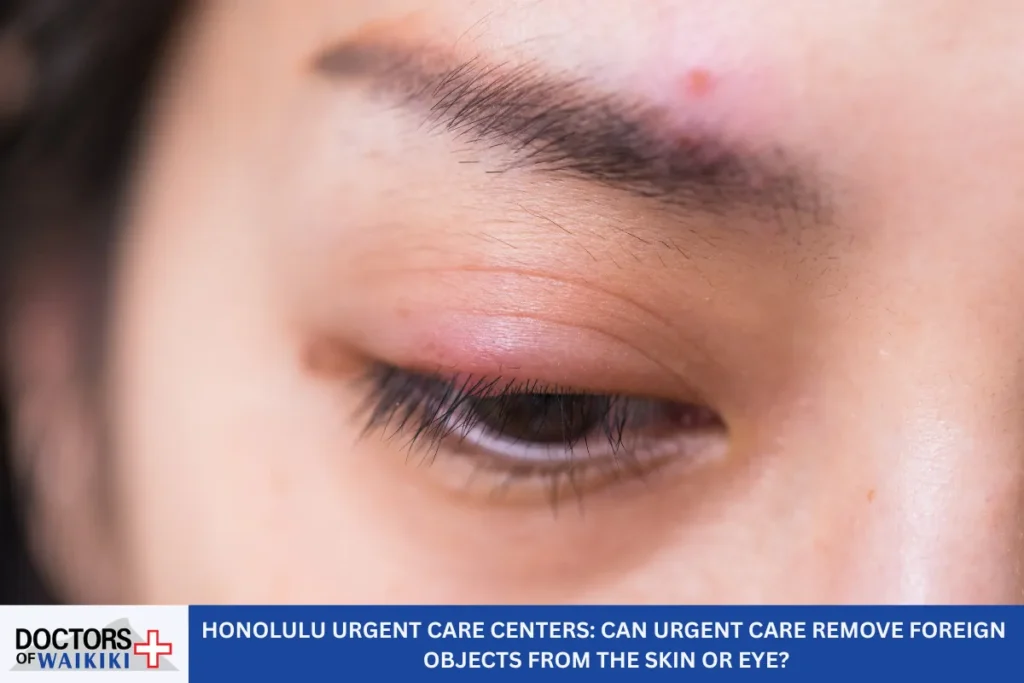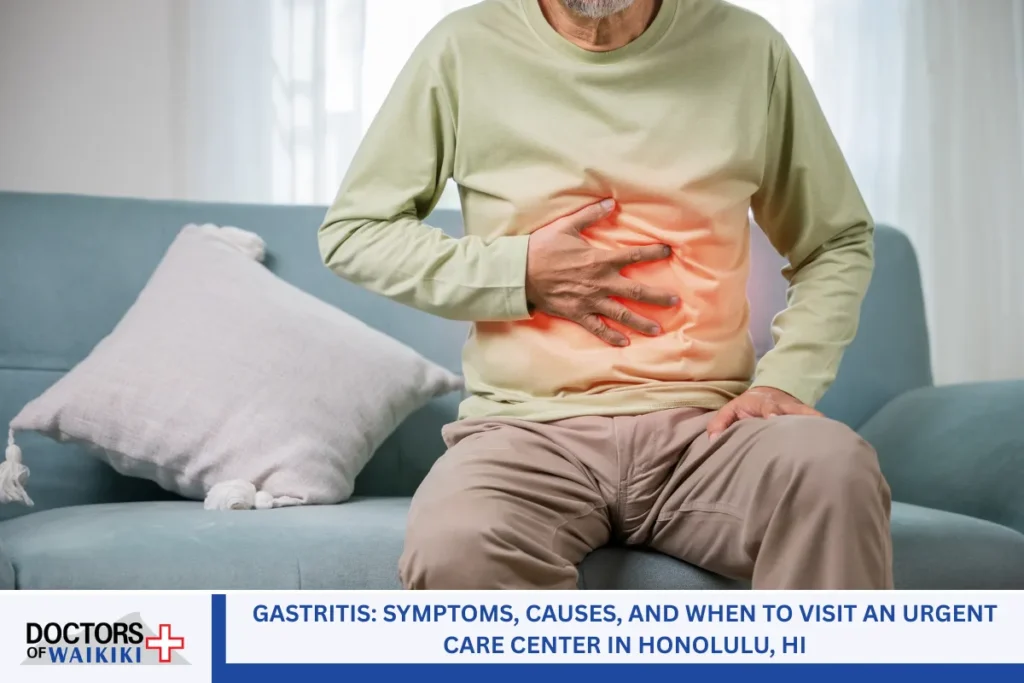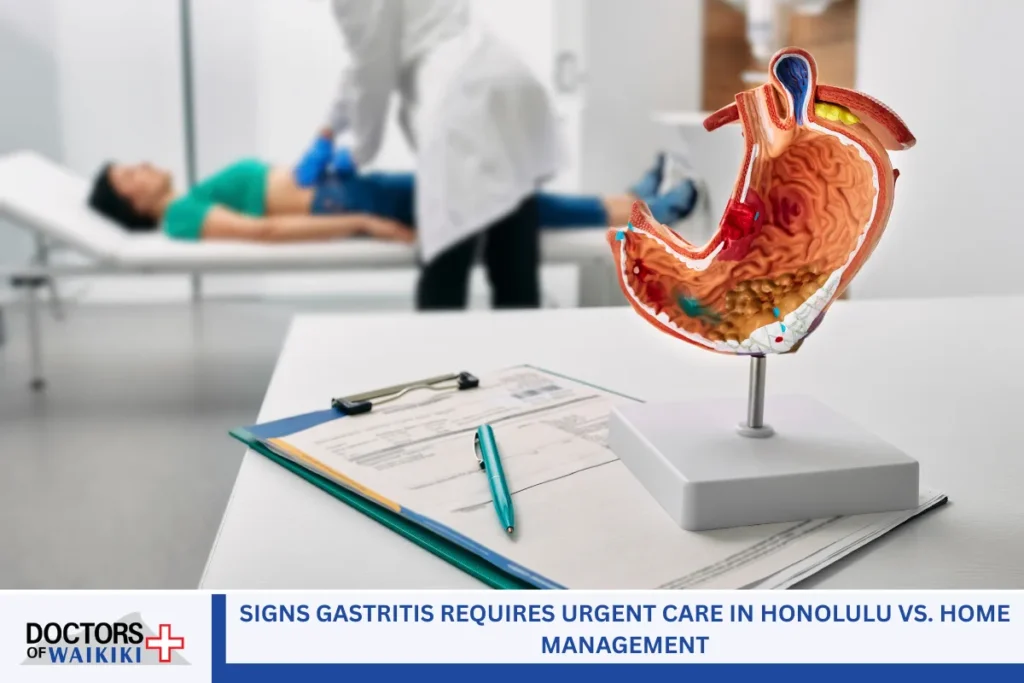Getting Fast, Effective Medical Help in Honolulu: Urgent Care Center or Primary Care?
If you’re searching for an urgent care center in Honolulu, HI, you’re likely dealing with a sudden medical issue that needs quick attention—but isn’t severe enough for the emergency room. Maybe it’s a minor injury, allergy symptoms, or flu-like symptoms that just can’t wait for a regular appointment with your primary care provider. The problem? Deciding whether to visit an urgent care clinic, a walk-in clinic, or wait for your next primary care visit. This uncertainty can make stressful moments even harder. Fortunately, understanding the strengths of urgent care services, walk-in clinics, and primary care options in Honolulu can help you make the right choice for your family’s immediate and long-term health care needs.
When to Choose Urgent Care for Minor Injuries
Quick, Walk-In Treatment for Nonemergency Conditions
Minor to moderate medical issues, such as sprains, cuts, burns, and allergic reactions, are common reasons why Honolulu residents seek out an urgent care clinic. Urgent care services are designed for patients who need immediate care but do not require the advanced resources of an emergency department. At an urgent care center, you can simply walk in—no appointment necessary—during extended hours of operation, including evenings and weekends. This flexibility is invaluable when minor injuries or sudden illnesses strike outside regular physician’s office hours or when primary care practices are fully booked.
Conditions Commonly Treated at Honolulu Urgent Care Centers
Urgent care centers in Honolulu manage a broad range of health issues, such as:
- Cuts, scrapes, and minor burns
- Sprains, strains, and simple fractures (often with onsite digital x-ray and orthopedic urgent care services)
- Respiratory infections and sore throats
- Allergies and hay fever symptoms like runny nose, watery eyes, nasal congestion, and sneezing
- Asthma care and mild respiratory distress
- Flu-like symptoms, fever, and coughs
- Mild head injuries, such as bumps and bruises
Patients also use urgent care options for occupational health needs, sports physicals, immunizations, and diagnostic tests such as laboratory services, biometric testing, STI screening, and COVID-19 testing.
Advantages of Urgent Care Services
- Short wait times: Patients are usually seen quickly, minimizing time spent away from work or family.
- No appointment needed: Walk-in care is available, so urgent needs are addressed without scheduling delays.
- Comprehensive urgent medical care: Onsite digital x-ray, laboratory, and medical consultation capabilities provide thorough evaluation.
- Wide range of services: Beyond injuries, urgent care clinics offer allergy testing, immunizations, workers comp injury treatment, and wellness services.
Understanding the Role of Primary Care in Treating Injuries
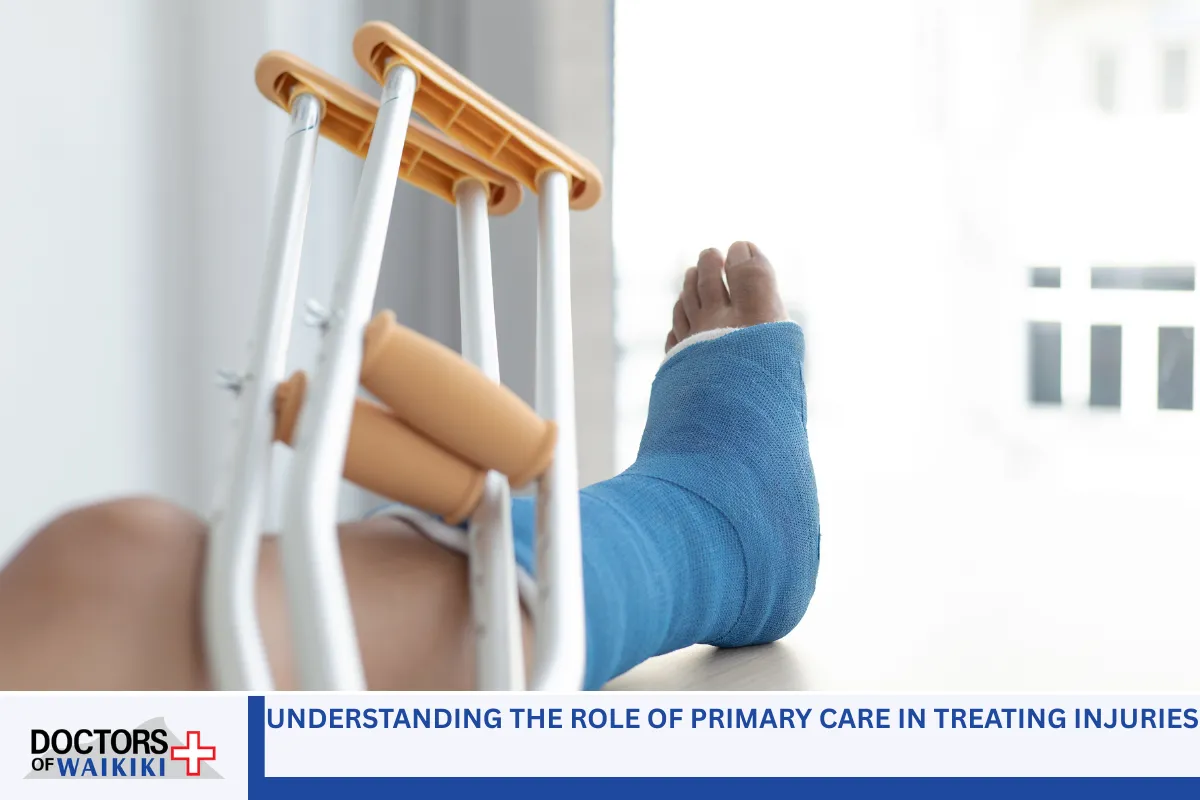
Primary Care Providers: The Foundation of Ongoing Health
Primary care is central to long-term health management in Honolulu. Primary care physicians and advanced practice providers (such as nurse practitioners and physician assistants) oversee your general health, manage chronic diseases, coordinate immunizations, and provide preventive care. When it comes to minor injuries, a primary care provider can deliver high-quality care—especially when there is a need to consider your full medical history information and develop a personalized treatment plan.
When to Choose Primary Care for Injuries
- Established patient relationships: If you already see a primary care provider who knows your medical history, chronic conditions, and allergies, they are well-positioned to manage your care after an injury.
- Follow-up needs: Ongoing issues, such as recovery from sprains, chronic disease management, and referrals to specialists, are best handled by primary care practices.
- Comprehensive health reviews: Annual physical exams, wellness visits, and chronic disease monitoring are often scheduled during primary care appointments.
Comparing Urgent Care Clinics and Primary Care for Minor Injuries
Accessibility: Walk-In Care vs. Scheduled Appointments
Urgent care centers and walk-in clinics in Honolulu offer extended hours and welcome patients without appointments, making them ideal for immediate care. Primary care practices may require you to schedule an appointment, which could mean waiting days for the next available slot. For families and individuals who value quick access, urgent care is often the better urgent care option for minor injuries and sudden health issues.
Types of Services Offered
Urgent care clinics provide a broad spectrum of healthcare services, including:
- Digital x-ray and diagnostic equipment for orthopedic urgent care needs, such as setting and casting broken bones.
- Lab services and diagnostic tests, including COVID-19 testing, TB blood test, and lab and test results for infections like gonorrhea and syphilis.
- Medical workforce that includes board-certified doctors, nurse practitioners, medical assistants, and advanced-practice providers.
- Immediate care for nonemergency conditions, acute injuries, and minor to moderate medical issues.
Primary care, on the other hand, focuses on:
- Ongoing management of chronic diseases such as diabetes care and asthma care.
- Preventive health care and immunizations.
- Wellness services, physical exams, and long-term care management.
- Coordinated care and referrals to specialists in internal medicine, orthopedics, or mental health.
Insurance Coverage and Out-of-Pocket Costs
Both urgent care clinics and primary care offices in Honolulu typically accept a wide range of insurance plans. However, it’s important for patients to verify their insurance coverage, co-pays, and any out-of-pocket costs before their visit. Urgent care services may have higher fees than a standard primary care visit, especially if advanced diagnostic tests or imaging facilities are needed. However, the cost is generally far lower than the emergency room.
Comparing Wait Times and Quality of Care
Wait Times: What to Expect
One of the main benefits of choosing an urgent care center or walk-in clinic is shorter wait times compared to primary care offices and, especially, the emergency department. Patients can often walk in, register, and be seen within an hour. This is a major advantage for urgent medical care needs that arise unexpectedly or during inclement weather when other health systems may have limited access.
Primary care practices may provide same-day appointments, but often require advanced scheduling—leading to delays for nonemergency care. Hospital systems and emergency rooms tend to prioritize severe injuries and life-threatening conditions, so minor injury patients may experience longer waits.
Quality of Care and Medical Professionals
Urgent care clinics in Honolulu are typically staffed by highly trained medical professionals, including board-certified doctors, nurse practitioners, physician assistants, and medical assistants. They use state-of-the-art diagnostic tools and laboratory resources to deliver high-quality medical care. Many urgent care centers collaborate with local healthcare providers and staff to ensure patient care records are updated and accessible for follow-up.
Primary care providers offer a continuity of care that is essential for chronic disease management, preventive health, and collaborative care across specialties. They have access to your complete medical records, allowing for a more personalized treatment plan.
Managing Allergies and Respiratory Symptoms: Where Should You Go in Honolulu?
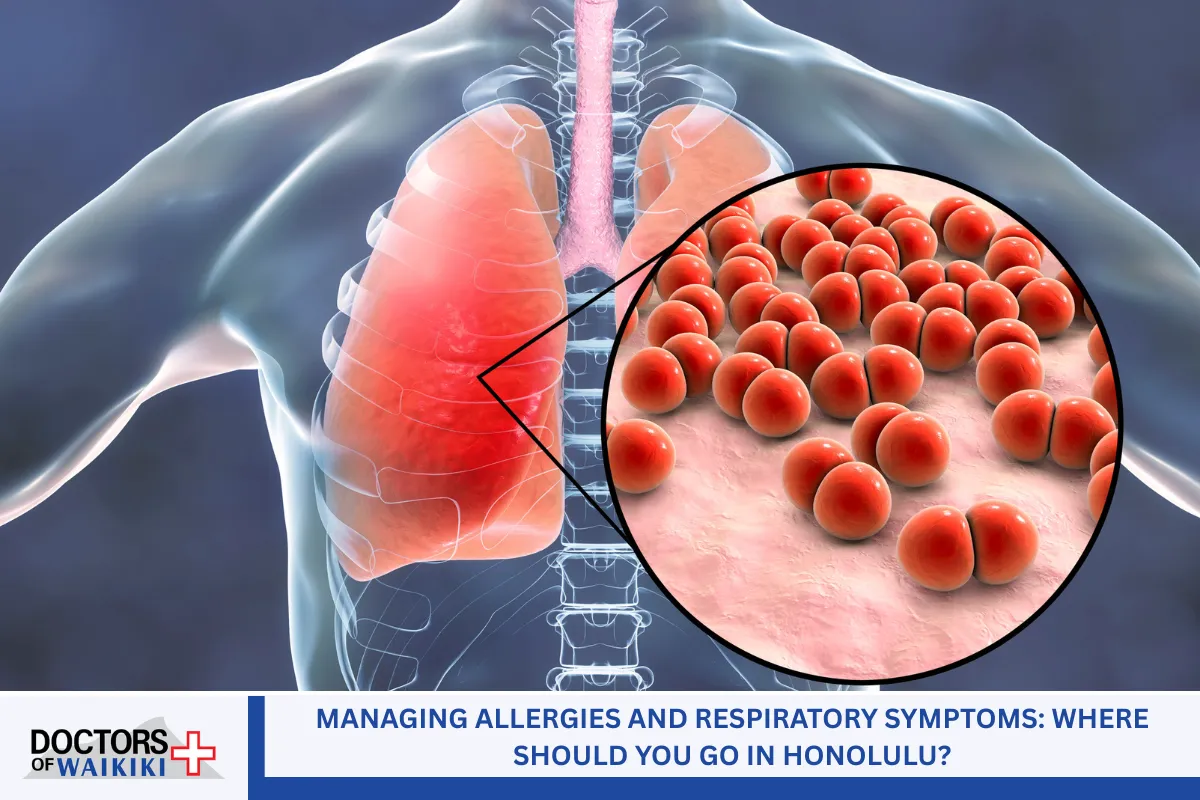
Seasonal Allergies and Immediate Relief
In Honolulu, seasonal allergies and hay fever can strike at any time of year, causing symptoms like runny nose, watery eyes, nasal congestion, sneezing, and general discomfort. An urgent care clinic or walk-in clinic offers convenient and effective allergy relief when symptoms become bothersome. Many clinics provide allergy testing, treatment for allergic reactions, and guidance on symptom management for common allergens found in the Hawaiian climate.
What Can You Expect for Allergy Care at an Urgent Care Clinic?
- Evaluation of symptoms: Medical professionals such as nurse practitioners and physician assistants quickly assess allergy symptoms and rule out more serious medical issues.
- Allergy testing: Some urgent care services offer rapid allergy testing to identify the specific allergen causing your immune response.
- Treatment plan: Walk-in clinics can provide antihistamines, steroid injections, and advice on managing allergies at home.
- Allergy education: Patients receive information about avoiding allergens and minimizing the risk of future episodes.
Primary Care and Long-Term Allergy Management
For patients with chronic allergies or complex medical histories, primary care providers can coordinate ongoing allergy treatment, prescribe maintenance medications, and provide referrals to allergy specialists or internal medicine physicians if needed. This collaborative care approach ensures comprehensive management of allergies and related chronic conditions.
When to Choose the Emergency Room Instead
Identifying True Medical Emergencies
While urgent care centers and walk-in clinics are perfect for minor injuries and moderate symptoms, there are times when you should skip urgent care and go directly to the emergency room or emergency department. Honolulu’s emergency medicine physicians and hospital systems are equipped for life-threatening emergencies and severe injuries.
Go to the emergency room if you experience:
- Chest pain or severe chest pain, especially with shortness of breath or radiating pain.
- Stroke symptoms, such as sudden numbness, confusion, or trouble speaking.
- Severe injuries, such as compound fractures, uncontrolled bleeding, or head injuries with loss of consciousness.
- Severe abdominal pain or suspected appendicitis.
- Uncontrolled allergic reactions (anaphylaxis) or difficulty breathing.
- Heat exhaustion or severe dehydration requiring IV fluids.
Why Not Urgent Care for Serious Medical Issues?
Urgent care clinics and walk-in clinics are not equipped for high-acuity emergencies that require specialized diagnostic equipment, stroke units, or immediate advanced interventions. If in doubt, it is always safest to seek emergency care for potentially life-threatening symptoms.
Walk-In Clinics and Minor Injury Units: A Local Perspective
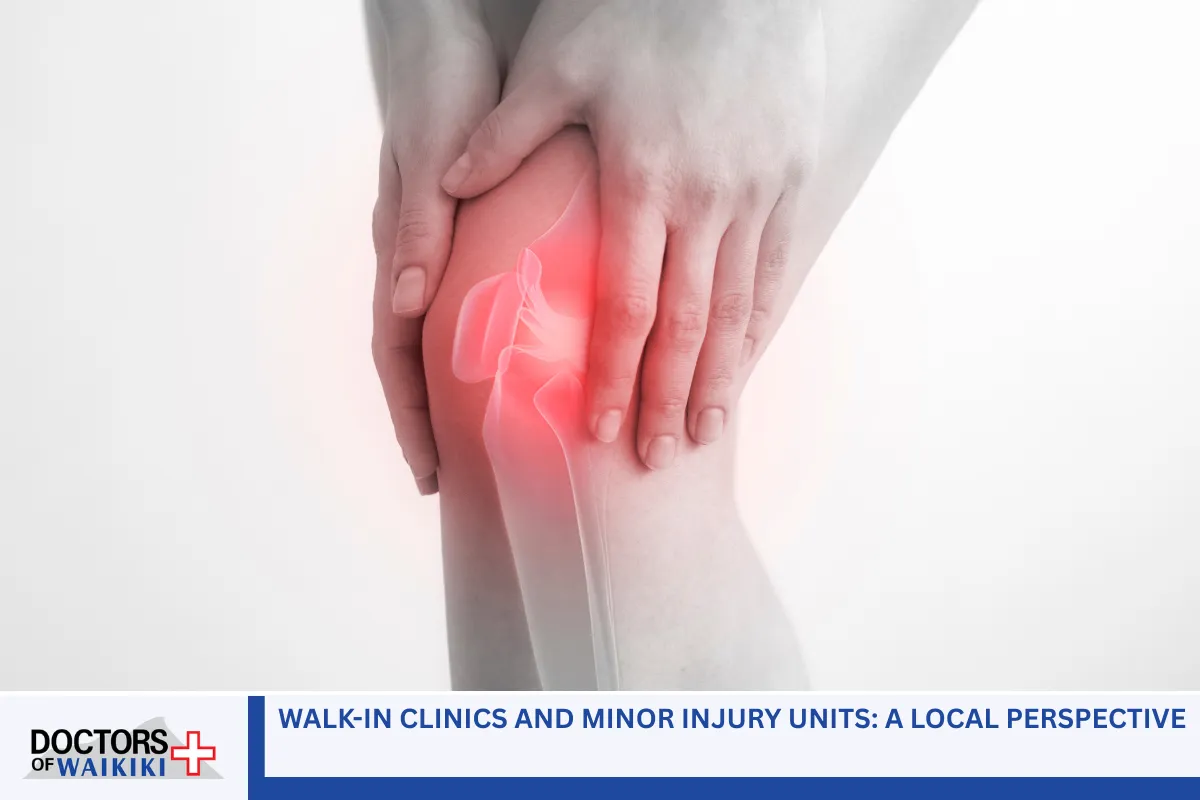
Honolulu’s Approach to Minor Injury Treatment
Many walk-in clinics and urgent ambulatory care facilities in Honolulu offer specialized care for minor to moderate medical issues, providing a valuable alternative to traditional primary care and crowded hospital systems. These clinics are designed for quick, efficient care, allowing you to walk in without an appointment, receive prompt treatment, and get back to your daily life. Some clinics specialize in orthopedic urgent care, with resources for setting and casting broken bones, managing sports injuries, and providing physical therapy referrals.
What to Bring for Your Visit
To streamline your care, bring the following:
- Insurance information and payment in full (if required)
- A list of current medications and allergies
- Vaccination records or immunization history (for school, sports, or immigration physicals)
- Previous medical history information and recent lab or test results (if available)
- Legal representative or documentation if needed for occupational health or workers comp injury treatment
Legal, Insurance, and Privacy Considerations for Honolulu Patients
Navigating Health Insurance and Out-of-Pocket Costs
Honolulu urgent care clinics and primary care offices generally accept most major health insurance plans, but coverage and co-pays can vary widely. Before seeking urgent care services, it’s important to:
- Confirm your insurance coverage, including urgent care and walk-in clinic benefits
- Understand any out-of-pocket costs or payment in full requirements
- Clarify whether your visit is for a covered health issue, such as diagnostic tests, lab testing, or preventive care
If you are uninsured or using a mobile health clinic or drug store-based walk-in clinic, ask about self-pay rates and available payment plans.
Protecting Your Medical Records and Privacy
All healthcare providers and staff in Honolulu must comply with federal and state privacy regulations. Your patient care records, lab results, and medical history information are confidential and securely managed. Clinics use advanced diagnostic tools, laboratory resources, and digital x-ray systems while protecting your privacy rights. If you need records transferred to your primary care physician or legal representative, request this at the time of your visit.
Workers’ Compensation and Occupational Health
For patients with workplace injuries or occupational health needs, urgent care clinics can provide immediate care management, biometric testing, and documentation required for workers’ compensation claims. Be sure to bring details about your employer, injury circumstances, and any relevant forms for your visit.
Enhancing Your Care Experience: Tips for Choosing the Best Urgent Care in Honolulu
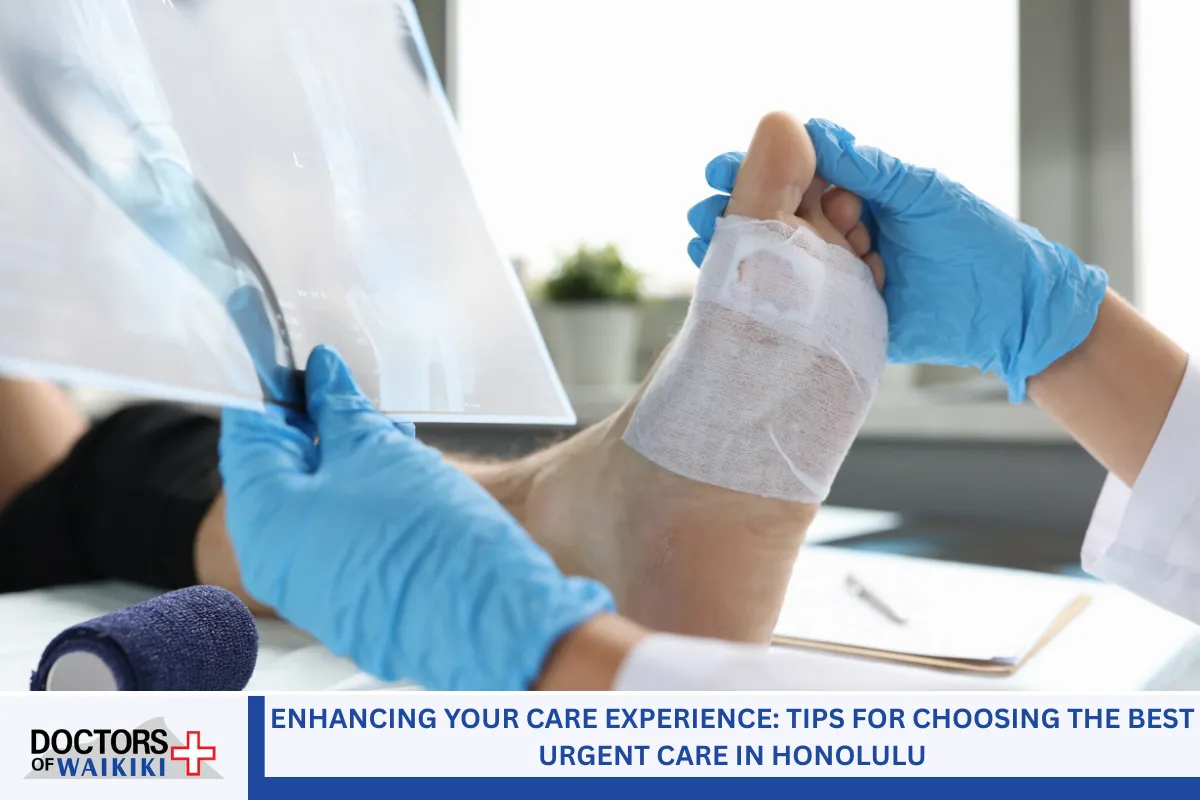
What Makes a Quality Urgent Care Center?
When searching for the best urgent care or walk-in clinic in Honolulu, consider these factors:
- Convenient address location and extended hours of operation
- Highly trained medical team, including board-certified doctors, advanced-practice providers, and skilled medical assistants
- Wide range of urgent care services, such as diagnostic tests, physical exams, laboratory services, immunizations, COVID-19 testing, and wellness services
- Strong customer service and clear communication with patients
- Collaboration with local health care systems and access to a full range of specialty care, such as orthopedics or internal medicine
Patient Satisfaction and Quality of Care
Look for clinics with high patient satisfaction ratings, positive reviews about short wait times, and a reputation for quality of care. The best urgent care clinics will communicate lab and test results quickly, address patient complaints, and provide a seamless healthcare experience from walk-in to follow-up.
Planning Ahead for Future Medical Issues
Consider establishing a relationship with both a primary care provider and a preferred urgent care clinic. This ensures you’ll have fast access to immediate care for acute conditions, as well as ongoing preventive care and chronic disease management through primary care. Keep a list of local clinics, their hours of operation, and contact information on hand, especially during inclement weather or busy seasons.
Making the Right Choice for Your Family’s Health in Honolulu
Finding the right treatment option for minor injuries in Honolulu, HI, depends on your specific health issues, personal medical history, and the urgency of your symptoms. Urgent care centers, walk-in clinics, and primary care practices all play vital roles in Hawaii’s healthcare system, offering unique benefits to patients and families. Whether you need immediate walk-in care for a sudden injury, ongoing management for chronic diseases, or rapid symptom management for seasonal allergies, understanding your local urgent care options can make a real difference in your health and peace of mind.
If you’re ever unsure, start with a trusted urgent care clinic for nonemergency conditions, and always seek emergency room care for serious symptoms like chest pain, stroke symptoms, or uncontrolled bleeding. By knowing when and where to go, you empower yourself to make smart healthcare choices and keep your family healthy—no matter what comes your way in beautiful Honolulu.
Urgent Care Center in Honolulu, Hawaii — Doctors of Waikiki
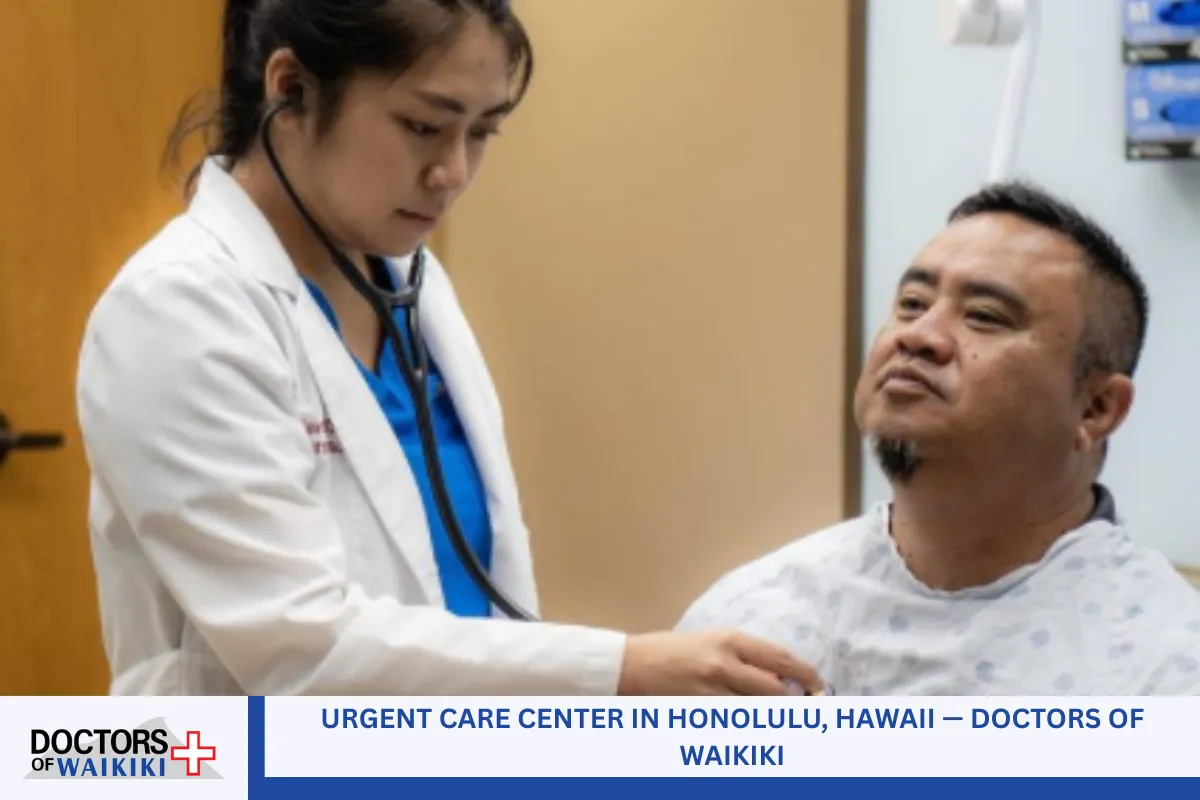
If you’re searching for a reliable urgent care center in Honolulu, Doctors of Waikiki is your trusted destination for fast, high-quality medical care. Conveniently located in the heart of Honolulu and serving surrounding areas, our urgent care clinic provides immediate walk-in services for minor injuries, allergy symptoms, flu-like symptoms, and more. Our medical professionals, including board-certified doctors, nurse practitioners, and medical assistants, are committed to your health and comfort. With short wait times, modern diagnostic equipment, and bilingual staff, we make getting the care you need easy and stress-free. For the best urgent care in Honolulu, call (808) 922-2112 or fill out our quick contact form today. Your health and peace of mind are our top priorities.
Frequently Asked Questions
1. When should I choose an urgent care center over primary care for a minor injury?
Urgent care centers are ideal for sudden, non-life-threatening medical issues that need attention within hours, not days. If you’ve suffered a minor injury—such as a sprain, simple fracture, cut, or mild burn—an urgent care clinic can provide immediate walk-in care, digital x-ray, and onsite laboratory testing. Unlike primary care offices, which may require an appointment and have limited hours, urgent care centers offer extended hours and weekend availability. This makes them a practical choice if your primary care physician is unavailable or if you need prompt care without waiting for an appointment. However, if your injury is part of a chronic condition or needs ongoing monitoring, follow-up with your primary care provider is recommended.
2. How do wait times compare between urgent care clinics, primary care, and the emergency room?
Wait times are one of the main differences between urgent care centers, primary care practices, and emergency rooms. Urgent care clinics and walk-in clinics usually have much shorter wait times than emergency departments, where patients with life-threatening issues are prioritized. Most urgent care patients are seen within an hour, especially if they walk in during less busy times. Primary care providers often require scheduling in advance, which can result in waiting days for a non-urgent appointment. Emergency rooms should only be used for severe injuries or symptoms, as wait times for minor injuries can be significantly longer. For quick, convenient treatment of nonemergency conditions, urgent care is often the best option.
3. What insurance considerations should I be aware of when visiting an urgent care center?
Before visiting an urgent care center, it’s important to understand your insurance coverage. Most urgent care clinics accept major insurance plans, but it’s always wise to confirm in advance to avoid unexpected out-of-pocket costs. Review your plan for urgent care co-pays, deductibles, and whether lab testing, digital x-rays, or other diagnostic services are covered. Some insurance policies require you to use a specific network of providers, so check if your chosen urgent care clinic is in-network. If you’re uninsured, urgent care centers generally offer self-pay options with transparent pricing. Always bring your insurance card and be prepared to pay any required co-pay or payment in full at the time of your visit.
4. What are common allergy symptoms treated at urgent care clinics in Honolulu?
Allergy symptoms such as runny nose, watery eyes, sneezing, nasal congestion, and mild skin rashes are frequently treated at urgent care clinics in Honolulu. Seasonal allergies, also known as hay fever, are common in Hawaii and can flare up unexpectedly due to unique local allergens. Urgent care centers provide allergy testing, immediate relief with antihistamines or corticosteroids, and advice on symptom management. If you’re experiencing mild allergy symptoms or suspect a mild allergic reaction, an urgent care center can help with diagnosis and a personalized treatment plan. Severe allergic reactions (anaphylaxis) require emergency room care, but most mild to moderate cases are managed efficiently at urgent care.
5. Are urgent care centers equipped to handle minor orthopedic injuries?
Yes, many urgent care centers and walk-in clinics are equipped to evaluate and treat minor to moderate orthopedic injuries, such as sprains, strains, simple fractures, and sports injuries. Services often include digital x-ray for quick diagnosis, setting and casting broken bones, and referrals for physical therapy if needed. If you experience swelling, pain, or limited mobility after an injury, urgent care is a convenient option for fast, effective treatment. However, for compound fractures or injuries with severe pain, uncontrolled bleeding, or visible deformity, the emergency department is recommended. For ongoing orthopedic care or chronic conditions, follow-up with a primary care physician or orthopedic specialist may be necessary.
Read Managing Respiratory Infections in Honolulu, HI: Urgent Care Centers vs. Primary Care Providers

